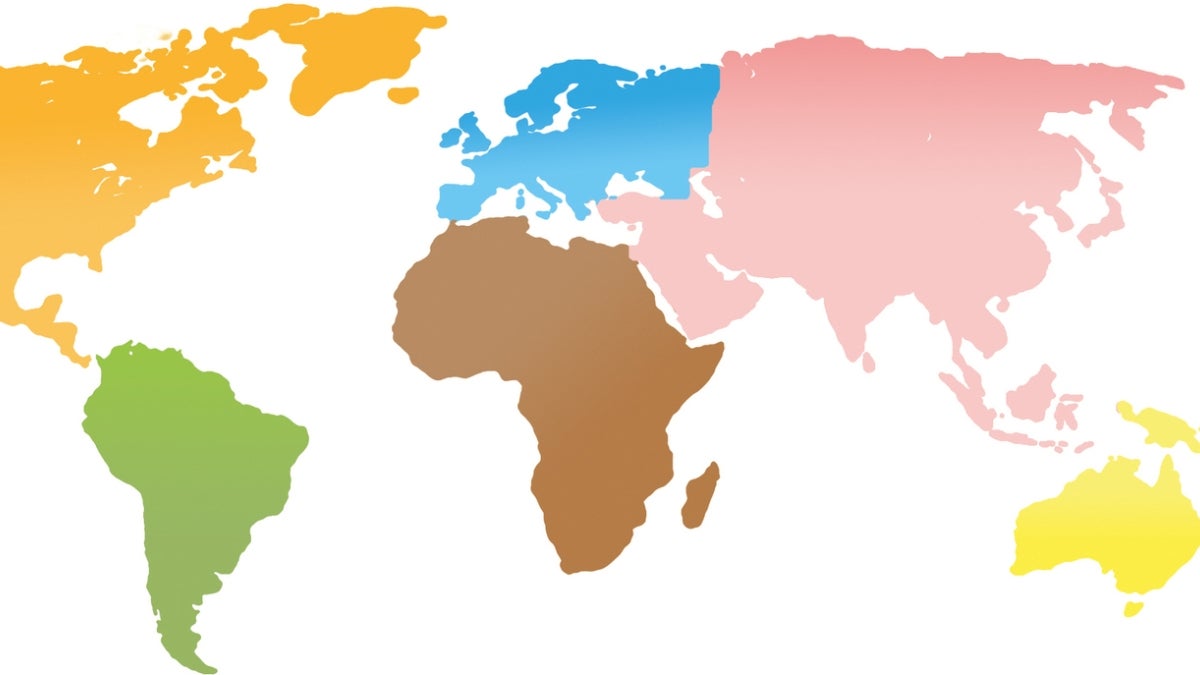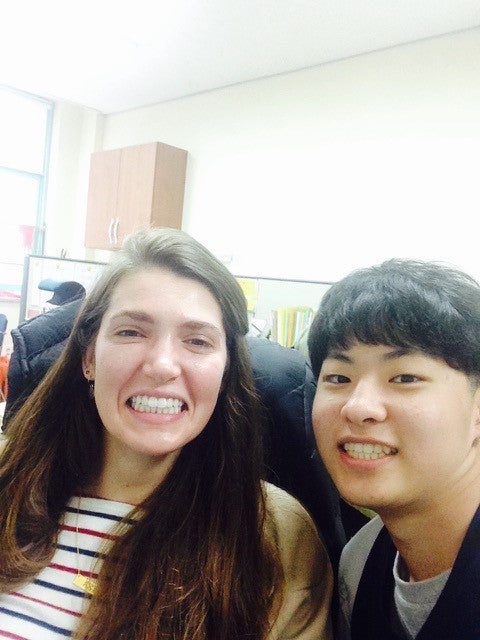Living abroad can be fraught with awkward situations, but the experience also nurtures the confidence it takes to laugh instead of cry when you have to eat a octopus.
For Jenna Smith, the challenge of her Fulbright year in South Korea has revealed an inner strength and perseverance she didn’t know she had.
“I have done so many things this year that I look back on and think, ‘I can’t believe I did that and survived,’ “ said Smith, who is an English Teaching Assistant at a middle school in Gwangju this year.
Grappling with the language, a heavy workload of teaching and even chopsticks has been tough.
“You surprise yourself. I have found that my mind gives up way before my body is willing to cave,” she said.
Smith, who is from Scottsdale, earned a bachelor’s degree from ASUfrom the College of Liberal Arts and Sciences in 2015, double majoring in classics and philosophy, with a minor in symbolic systems. She’ll attend the University of Pennsylvania Law School in the fall.
She answered a few questions about her Fulbright year:
Question: Can you give an overview of what you’re doing in South Korea?
Answer: I teach 24 English-as-a-second-language classes every week at Jangdeok Middle School in Gwangju. I live with my co-teacher and her family, so we have become really close. I also teach smaller after-school classes for teachers and some students who want to improve their English.
Jenna Smith, left, in South Korea.
Q: What is a typical day like for you?
A: I wake up at 7 a.m., eat breakfast with my host dad, then head to school with my host mom around 8 a.m. The walk to my office from the parking lot in the morning is the highlight of my day. It’s a blur of “Hello Teacher!” shouts, bows, waves and the occasional hug tackle.
Class starts at 9 a.m. and I typically teach three 45-minute classes before lunch. Lunch is always a traditional Korean meal: rice, soup, kimchi. All the teachers sit together in the middle of the gender-segregated cafeteria so that we can monitor the students.
After lunch I teach two classes and then I walk home, which really helps me to decompress before I exercise at the gym in our building, plan lessons or finish writing my articles for the Fulbright Korea Alumni Newsletter. I eat dinner with my host family every evening before retiring to watch American TV in my room on my computer. It helps me combat homesickness. And sometimes there is a late-night knock on my door from my host dad, beckoning me to eat fried chicken with him on the floor of the living room.
Q: What do you do on the weekends?
A: I typically travel on the weekends to Seoul to hang out, explore, eat and relax with my English teaching assistant friends. We also enjoy hiking and traveling to other Korean cities such as Gyeongju, Busan, Sokcho and Sejong.
Q: What’s been the best part of your experience?
A: My students are definitely the highlight of my grant year. They challenge me every day to be more creative and excited. They never cease to bring a smile to my face as they navigate expressing themselves in English. Their willingness to try to use a foreign language makes it easier for me to laugh at myself and to not take myself super seriously as I simultaneously navigate living in a foreign country.
Q: Have there been any challenges?
A: In the beginning of my grant year, I was a fish out of water. The first time I heard Korean and ate Korean food was on the plane ride to my new home. I had never used chopsticks before, let alone taught an English class to 35 students or lived in a country where I couldn’t speak any of the language.
I think teaching poses its own set of challenges, but teaching English in a foreign country comes with its own unique difficulties. At first, it was hard to express myself at school given the language barrier and cultural differences, and even harder to eat lunch. But it gets a lot easier with time and patience. I would be nothing without the support and generosity of my host family, my students, my co-teachers, and the Fulbright Korea ETA network.
Q: Has anything funny happened during your adventure?
A: Two things:
Since I don’t speak Korean very well, I assumed that what my host mom called my host dad at home was his name, so I also starting using this name when I wanted to reference him or get his attention. Each time it was met with a strange and awkward look, which I chalked up to my poor pronunciation — until I realized after asking my students that I was calling him “sweetie” or “honey” in Korean. Oops.
At the beginning of the new school year, all the staff and faculty at my school went out to celebrate with special Korean soup. I had a seat at the table right in front of the pot where our soup was cooking. This also meant that I had a front-row seat as three live octopi were lowered into our soup pot one by one and cooked to death as their tentacles squirmed inside and out of the pot, begging for mercy. In Korea eating live octopus is a delicacy. I courageously tried a small piece in an effort to step out of my comfort zone. I ended up screaming and panicking when the suckers on one of these octopus's tentacles latched onto the inside of my cheek and wouldn’t release as I tried to swallow.
Q: What will you bring back from your experience that will help you in your career — or your life?
A: Take one day at a time. Don’t be too hard on yourself. When navigating unchartered territory you are bound to make mistakes, so laugh at yourself, learn from the experience and move on. Don’t dwell. When things aren’t going as planned and you want to give up, be brave.
Q: What would you tell someone who is contemplating applying for a Fulbright?
A: Fulbright is a once-in-a lifetime experience, but you should understand what you are applying for and the nature of living and working in a foreign country. With that said be brave, take courage and apply. I have learned invaluable lessons about myself and what I am capable of doing this year. My perspective on the world, my American identity, and what it means to be human in this day and age have changed profoundly for the better. If it weren’t for this experience, I think I would be a much different person embarking on adulthood in America.
More Local, national and global affairs

Overdose crisis involves more than opioids, says ASU social work professor
News coverage about the escalating number of drug overdoses in the United States can lead many to conclude that so long as you’re not overdosing yourself, the crisis doesn’t really affect you.Wrong,…

What’s next for unions? ASU center investigates evolving strategies in new report
Port workers hanging up their hats on the East Coast. Starbucks employees putting down their aprons before Christmas. Ski patrollers signing off in Park City as fresh powder piles up. The past year…

Protecting national security in a rapidly changing world
As the 21st century dawned, the challenges facing our nation and the world — such as cyberthreats, resource scarcity and space security — became too big to solve with traditional research methods.…

